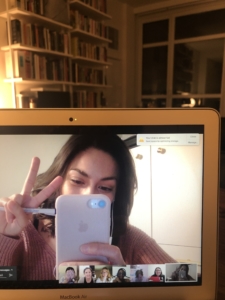Writing in Conversation
 Hearing someone else’s perspective inspired me. That’s what I’d forgotten.
Hearing someone else’s perspective inspired me. That’s what I’d forgotten.
It was 2016. I’d lived in New York City for almost four years. I was still working on a YA manuscript that I started writing four years ago during NaNoWriMo. I’d had one short story published in a magazine, but that was a while back. I had a new desk job in the city where I tried to dodge invitations to go to Chop’t on my lunch break so I could write. I had a writing partner who lived in Albuquerque, and we were working on TV scripts together. Our G-chats about story ideas were fun, full of energy, and always gave me ten new ideas for our script. But novel writing remained a long and lonely process. I wasn’t ready to put that story away, but I wasn’t sure how to move forward with it, either. I found myself thinking back to the creative writing workshops and playwriting classes I took in college, sitting in circles and shuffling pages and reading each other’s stuff out loud, talking about it, how full of possibility that time felt. How much listening to someone else’s perspective sparked ideas of my own.
***
When I first moved to New York, for my partner’s job, I didn’t really know anyone here. I had joined the website Meetup.com, thinking that perhaps I’d join a kickball league or something like that, as I had done with my co-workers back in Chicago. The only one who took it seriously was the security guard at the school where we worked, who probably hated the rest of us because all we did was laugh the whole time. We were the worst in the league, never winning a single game. It was the best.
On Meetup, I scrolled through pages and pages of opportunities like that, but I never clicked on any of them. What if everyone actually cared about kickball, softball, ultimate frisbee? What would I even talk to anybody about? I almost deleted my account. Then, one day, there was an email notification about a YA writers group. Here I was, watching YouTube videos about writing, reading tweets from writers (and never tweeting), and reading YA books without anyone to discuss them with. This could be my kickball league moment, except this time, I cared about kickball and so did everyone else.
I had to miss the first meeting which made me even more nervous to show up to the second. What if everyone had already bonded? What would I say? What if they thought I was weird? I tried to set all that aside as I climbed the stairs and entered the room. There, all seated around a table in a Midtown deli, were people who also loved YA books and were writing them, too. They were writing everything from fantasy to sci-fi to magical realism. They were reading the same books that I was reading, but had also heard about and read books that I hadn’t yet. Some of them worked in publishing and some of them didn’t. What we had in common was that we didn’t want to do it all alone anymore. Of course we had lots to talk about.
The group was founded and facilitated by a wonderful author who organized the critique sessions, coordinated the distribution of pages to read, as well as outings to literary events and social events for us to get to know each other. It was so fun to go to book events with other people who were excited about them and to discuss what we were reading together. It was also clearly a lot of work to organize it all, especially when the group had grown so large, with hundreds of people having joined the group on the website. In-person attendance would vary and it was usually somewhere between 5-12 writers who would show up. After about a year of doing critiques, book discussions, and event outings, the founder wasn’t able to coordinate any longer. When they asked another writer and myself to take over in order to keep the group going, we both said yes right away. Through reading and critiquing each other’s work, we’d become friends with each other and with other writers in the group, and we wanted to stay involved.
We reviewed the submission procedures together, divided up the work, and got started. As writers came and went from the group, we bounced around to a few different meeting locations in an effort to keep things convenient, all in Manhattan where many of the writers worked, and meeting times, mostly in the “after work” timeframe of 5:30-7:30 pm. We accepted two 10-page submissions for each critique meeting. The first two submissions we received would be uploaded to Dropbox and the links provided to everyone who RSVP’d for the upcoming meeting. We experimented with schedules: monthly, every other week, or every week that we had pages.
 A core group of regulars had formed, but just about every meeting there was at least one new writer. Sometimes a regularly-attending writer would be uncomfortable sharing their work with someone they had never met before, so they’d opt not to come. Sometimes a new writer didn’t follow the meeting instructions we had shared with them so we had to spend time navigating that. Sometimes a new writer gave feedback that didn’t sit right, or was discouraging. Some writers who had seemed really interested stopped coming. My co-facilitator and I discussed it. We couldn’t see a way to maintain the kind of group we wanted with this revolving door of participants. It had all gotten to be too much to coordinate. We posted a message on the Meetup page and offered to pass the baton to anyone who was interested in keeping it up because we would be stepping aside. No one came forward.
A core group of regulars had formed, but just about every meeting there was at least one new writer. Sometimes a regularly-attending writer would be uncomfortable sharing their work with someone they had never met before, so they’d opt not to come. Sometimes a new writer didn’t follow the meeting instructions we had shared with them so we had to spend time navigating that. Sometimes a new writer gave feedback that didn’t sit right, or was discouraging. Some writers who had seemed really interested stopped coming. My co-facilitator and I discussed it. We couldn’t see a way to maintain the kind of group we wanted with this revolving door of participants. It had all gotten to be too much to coordinate. We posted a message on the Meetup page and offered to pass the baton to anyone who was interested in keeping it up because we would be stepping aside. No one came forward.
But we both still wanted a writing group. We loved each other’s work and the work that had been shared in the group. We’d gotten so much from the sessions and the outings. We just wanted something more intimate, something we had more control over. Something we could keep safe and develop more routines around rather than always having to onboard, or feel out whether someone was willing to give as much as they’d get (and frankly, to make sure they weren’t a creep). So we reached out to a few of the regulars to ask if they wanted to keep critiquing, just us. I’m happy to report that they did, and that we’re still going to this day. We meet every other week, whether or not there are pages, and since March 2020 we’ve been meeting online via video conference.
If you’re a writer thinking about starting a critique group, let this be your sign to go for it. I can share a few things to keep in mind that have worked well for our group and could apply to others. One factor that I believe keeps our group working so well is that we all share similar goals. We are working seriously on our writing with a goal to improve. We’re all writing for a teen or middle grade audience (although some of us not exclusively) and working towards traditional publishing (though again, not exclusively). So aside from the creative work, we’re in similar places in terms of looking for agents/editors and just navigating the logistics of the publishing process generally. We can look at each other’s synopses and query letters and help to polish up the first ten pages of each other’s manuscripts, which agents typically ask for. We can share in the triumphs of getting a request and support each other through the R&Rs, as well as try to decode the feedback in the rejections, and discuss the issues of the industry overall.
Another element to our longevity, I believe, is that we have been open and adaptable to each other’s needs. This includes writerly needs and as well the practical needs of daily life. Someone has therapy on Thursday? We meet on Wednesdays now. Someone is volunteering on Wednesdays? We meet on Tuesdays now. Someone got a full manuscript request—okay, who is available to do swap?
Another thing we’ve been working on recently is formalizing our own critiquing procedures. This became important as we developed our routines and began moving away from the silent-writer-listens-while-everyone-gives-notes model that we’d been using. We discussed different strategies to make sure each writer is getting what they need from the meeting, and put all that in a shared Google Doc for everyone’s reference.
This procedure includes things like giving the writer the floor before we start the critique so they can ask us specific questions and talk a little bit about the work, including how they are feeling about it that day. They can let us know how long they have been working on it— is it first draft or a tenth? They can tell us what they’ve already worked on and what their goals for the piece are. So, if they say something like, I’m not sure the tone is consistent, we can speak to that, and not spend too much time discussing something else, like setting. We still give the writer our individual notes and critique letters after the meeting so that they can consider all of the elements we commented on, but we think it’s important to let the writer drive the meeting. So if someone is having one of those days when it all feels impossible and they’re not sure they can keep going, they can say something like, compliments only please, and we’re more than happy to oblige.
It’s been such a gift to be able to grow together, as writers and as friends, over the years. Novel writing can be an isolating process, and I suppose some can probably go it alone, but not me. Reading the work of other writers and talking with them about their work has made me a better writer. Writing a book, after all, is like having a long conversation with everything (and everyone) that you’ve ever read. I’m so grateful for the special bond that I’ve found with writers I can be in conversation and community with. Being in this group gave me the confidence and motivation to apply to an MFA program, where I could expand my community of writers. Looking back, I really hope that the security guard at my old school has found a kickball team where everyone is just as into it as they are. It’s the best.





